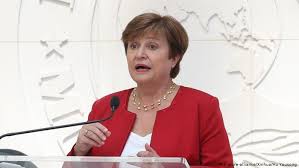The International Monetary Fund (IMF) has projected that Nigeria and other countries could lose an estimated $10 billion of foreign direct investment and official development assistance inflows to geo-political tensions.
The IMF made this projection in its Country Focus on Sub-Saharan Africa (SSA) report published on Monday, indicating that the figure represented about a half per cent of Nigeria’s annual Gross Domestic Product (GDP).
Specifically, the Washington-based development finance institution warned that “the losses could be compounded if capital flows between trade blocs were cut-off because of geo-political tensions and that reduction in FDI inflow to the region could, in the long run, also hinder much-needed technology transfer.”
According to the report, the IMF pointed out that if geopolitical tensions were to escalate, SSA countries could be hit by higher import prices or even lose access to key export markets and that the region’s value of global trade could be impacted.
It further predicted: “Sub-Saharan Africa could stand to lose the most if the world were to split into two isolated trading blocs centered around China or the United States and the European Union. In this severe scenario, sub-Saharan African economies could experience a permanent decline of up to four per cent of the real Gross Domestic Product after 10 years.
“According to our estimates, these are losses larger than what most countries experienced during the global financial crisis”, the IMF added.
The report indicated that while economic and trade alliances with new economic partners, predominantly China, have benefited the region, economic trade alliances had also made countries reliant on imports of food and energy more susceptible to global shocks, including disruptions from the surge in trade restrictions following Russia’s invasion of Ukraine.
The IMF expatiated: “For countries looking to restructure their debt, deepening geo-economic fragmentation could also worsen coordination problems among creditors. The region would fare better if only the US/EU cut ties with Russia and sub-Saharan African countries continue to trade freely. In this scenario trade flows would be diverted towards the rest of the world, creating opportunities for new partnerships, and possibly boosting intra-regional trade.”
However, it maintained that since some African countries benefit from access to new export markets and cheaper imports, the region would not incur a GDP loss.
It added that oil exporters supplying energy to Europe could even gain. IMF called for strengthening the African Continental Free Trade Area to better manage these shocks properly.
The Fund stated: “To better manage shocks, countries need to build resilience. This can be done by strengthening the ongoing regional trade integration under the African Continental Free Trade Area, which will require reducing tariff and non-tariff trade barriers, strengthening efficiency in customs, leveraging digitalization, and closing the infrastructure gaps. Deepening domestic financial markets can also broaden sources of financing and lower the volatility associated with relying too much on foreign inflows. To take advantage of the potential shifts in trade and FDI flows, countries in the region can try to identify and nurture sectors that may benefit from trade diversion like energy. Commodity exporters in the region could potentially displace much of Russia’s energy market share in Europe.”
IMF advised countries in the region to rely on trade promotion agencies to help identify potential opportunities and build the necessary skills and capacity for exports.
It further advocated: “Countries can also rely on trade promotion agencies to help identify potential opportunities, build the necessary skills and capacity for exports, and eventually re-orient production to take advantage of new trade flows.
“Improving the business environment by lowering entry, regulatory, and tax barriers could also help. What the exact outcomes will be from fragmentation and polarization, and whether these trends will continue are uncertain. What is clear, however, are multilateral institutions will need to continue to facilitate dialogue among nations to promote economic integration and cooperation”, it added.






